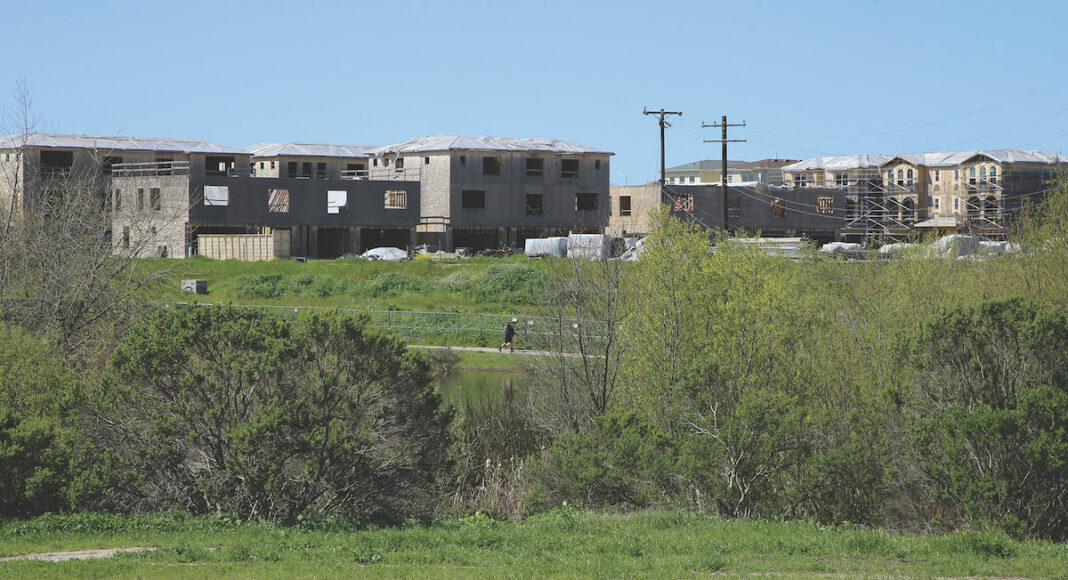Although the city of Watsonville has made modest gains in its state-mandated housing goals, it will need to nearly triple the number of units it has built over the past five years before 2023.
That sobering reality presented to the City Council at its virtual meeting on Tuesday was followed by another: the city’s housing goals will likely increase significantly when the state hands local governments a new set of benchmarks in the near future.
As it stands now, 235 housing units have been completed in Watsonville since 2016. But in order to meet its Regional Housing Needs Allocation it will need for another 465 units to be completed over the next three years.
The good news? A handful of large housing developments already approved by the City Council could be completed by then, giving the city more than enough new units to meet that goal.
Those projected developments include two affordable apartment complexes off Freedom Boulevard from nonprofit developers Mid-Pen and Eden housing. But they also include another two projects off of Ohlone Parkway that have stalled for various reasons.
The Hillcrest Estates project is expected to return to City Council this summer with alterations to its overall plan, but the Sunshine Gardens project is still stuck in limbo because of a “significant backlog of construction and building challenges,” according to City Manager Matt Huffaker.
“It has certainly been a challenging development,” Huffaker said of the Sunshine Gardens project.
Of the 235 completed units, only 28 fall under the “very low” or “low” income level, and only 13 have been built for “moderate” income residents. Those numbers underscore the need for affordable housing in the city that has 73% of residents living below Santa Cruz County’s median household income level.
Watsonville Housing Manager Carlos Landaverry said that many of those residents, however, do not know they fall below the city’s low-income threshold—about $77,000 for a family of four—and qualify for several of the city’s mortgage assistance programs that help residents purchase market rate and affordable units.
Landaverry said the city will resume its community forums to educate residents about the resources available to them when the pandemic subsides.
“We still have to do a lot of work and we are committed to continue our outreach efforts as soon as we are able to,” he said.
It is still unknown if the city will face any repercussions if it does not meet its current RHNA goal. Community Development Department Director Suzi Merriam said that the state has only required cities to adjust their zoning standards so that they have the potential to accommodate the number of units in their overall goal.
Watsonville, strapped for land and already densely populated, is trying to fit that bill with its Downtown Specific Plan, which could completely reimage the amount of housing units allowed in properties throughout the historic corridor.
“We can only do the best that we can do,” Merriam said. “Across the entire state, everybody needs housing. In Watsonville, we’re just doing our part.”
In other action, the City Council saw the results of a community-wide survey conducted earlier this year by GreatBlue Research. A total of 770 people took part in the 60-question survey—500 online and 270 over the phone—between Jan. 8 and Feb. 16.
Some of the major takeaways from the survey were:
- The majority of respondents (84.5%) were satisfied with how the city was serving the community.
- Respondents said that developing affordable housing units, reducing crime, increasing community policing and rebuilding infrastructure should be the city’s top priorities.
- The vast majority of respondents (87.4%) said the city needed to develop more programs to reduce crime, drug use and gang activity.
- Nearly all respondents (95.5%) said the city should create additional jobs and housing near already existing infrastructure to help preserve natural and agricultural land. In addition, nearly the same number of respondents (94.5%) said the city should do this by renovating its historic buildings.
- The library was considered a major contributor to a positive “quality of life” by nearly all respondents (98.2%).
- Fewer respondents aged 18-34 (61.6%) rated Watsonville Police Department positively than those 55 and older (71.7%)
- A majority of respondents (61.4%) said they would support paying another tax to expand the city’s recreation programs, parks and open spaces.
The results of the survey, Huffaker said, serves as a “rich data set” that the city will use as it approaches its two-year budget planning process in the coming months.
In the weeks leading up to those budget hearings, the city is asking for the community’s input via a three-question open-ended survey. The results of that survey will be presented to the City Council sometime next month, and a draft budget will be available for the public on May 30.
The city is also holding community meetings about the budget process Thursday and Saturday.
The city’s budget-related survey includes a question about how residents would want to spend so-called one-time funds. That question, Administrative Services Director Cindy Czerwin said, was directly related to the $18.8 million that city will receive from the American Rescue Plan, the $1.9 trillion stimulus recently signed into law by President Joe Biden.
It is still unknown what those funds can be spent on, Czerwin said, but early indicators are that it can be used to replace lost revenue and negative economic impacts from the pandemic, and fund infrastructure investments in the water, sewer and broadband systems.
The cash will be distributed to the city in two payments one year apart, Czerwin said.














